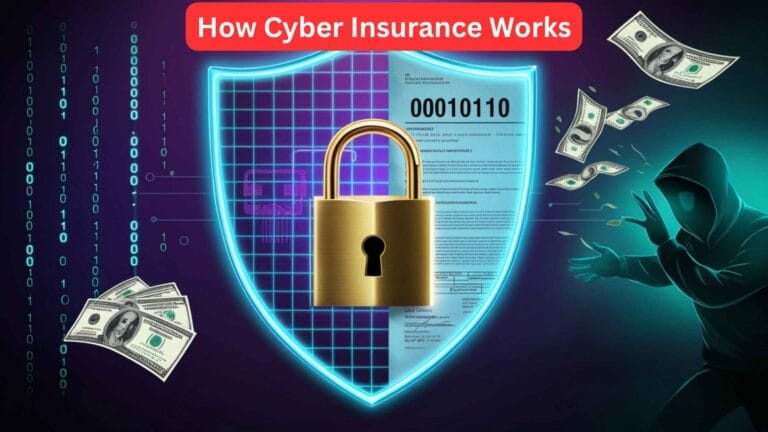Ever wake up to an email saying, “Your data has been hacked”? That sinking feeling is all too real, whether you’re a small business owner or just someone who shops online. Cyberattacks aren’t just for big corporations anymore. In 2024, a business falls victim to ransomware every 11 seconds, and the average cost of a data breach hit $4.45 million (IBM Security).
Here’s the good news: Cyber insurance can be your financial safety net. But is it worth it? Who really needs it? And how does it actually work? Let’s break it down, no jargon, just straight answers.
“Is Cyber Insurance Just for Big Companies?” Here’s What’s Really Happening
No, small businesses and even individuals are now prime targets.
The Myth vs. Reality
Most people assume cybercriminals only go after Fortune 500 companies. But here’s the truth:
- 61% of SMBs experienced a cyberattack in 2023 (Verizon DBIR).
- Healthcare providers, law firms, and freelancers are hit hardest because they often lack strong security.
One of my clients, a small dental practice, thought they were “too small to be hacked.” Then a phishing email tricked their receptionist into downloading malware. Result? A $50,000 ransomware demand + $20k in legal fees for patient data leaks. Their $3,000/year cyber insurance policy? It covered everything.
Who Needs Cyber Insurance?
- Businesses (even solopreneurs with client data).
- E-commerce stores (handling credit cards).
- Healthcare/legal professionals (storing sensitive info).
- Individuals (if you’ve ever saved payment details online).
The Hidden Factor Everyone Overlooks: It’s Not Just About Hackers
Cyber insurance also covers human error, your biggest risk.
The Surprising Stats
- 95% of breaches are caused by mistakes (like clicking phishing links) (World Economic Forum).
- Employee slip-ups (lost laptops, misconfigured cloud storage) trigger 40% of claims (NetDiligence).
Before buying insurance, do a free self-audit:
- Check if your email domain has DMARC/DKIM (prevents spoofing).
- Use Have I Been Pwned? to see if your data was leaked.
- Enable multi-factor authentication (MFA) everywhere.
Insurance companies reward proactive security. Some even offer discounts if you use encrypted backups or train employees.
“But I Have Antivirus!” Debunked: Why Tech Alone Isn’t Enough
Antivirus is like a lock on your door, but burglars pick locks.
Where Traditional Security Fails
- Ransomware bypasses antivirus by tricking users.
- Cloud misconfigurations (like public Google Drive links) aren’t blocked by firewalls.
Cyber Insurance Covers What Tech Can’t:
– Legal fees (if sued over a breach).
– Customer notification costs (mandatory in 48 states).
– PR crisis management (hacks ruin reputations).
Imagine your business as a house. Antivirus = locks. Cyber insurance = a security guard who also pays for repairs if someone breaks in.
Step-by-Step: How to Get the Right Cyber Insurance in 2024
Follow this checklist to avoid overpaying or gaps in coverage.
Phase 1: Assess Your Risk
- Low risk (bloggers, consultants): $1M policy (~$500–$1,500/year).
- High risk (healthcare, e-commerce): $5M+ policy (~$5k–$15k/year).
Phase 2: Compare Policies
Must-Have Coverages:
- First-party coverage (your losses: ransomware, downtime).
- Third-party coverage (lawsuits from clients/customers).
- Social engineering fraud (if a hacker impersonates your CEO via email).
Common Exclusions:
- Prior breaches (you can’t insure after the fact).
- State-sponsored attacks (some policies exclude “acts of war”).
Phase 3: Prove You’re Insurable
Insurers may ask:
- Do you use MFA and encrypted backups?
- Have employees done security training?
- Is your software patched?
Bundle with general liability insurance for discounts.
Final Verdict: Is Cyber Insurance Worth It?
For most businesses and high-net-worth individuals: Yes.
- Cost: Cheaper than a single breach.
- Peace of mind: Sleep better knowing $1M+ in costs are covered.
For individuals: Depends. If you’re regularly targeted (e.g., crypto traders, public figures), consider identity theft coverage (often $10–$30/month).
Remember: Cyber insurance isn’t a substitute for security, it’s your last line of defense. Lock your doors (use strong passwords), but keep a guard on standby too.
Sources:





